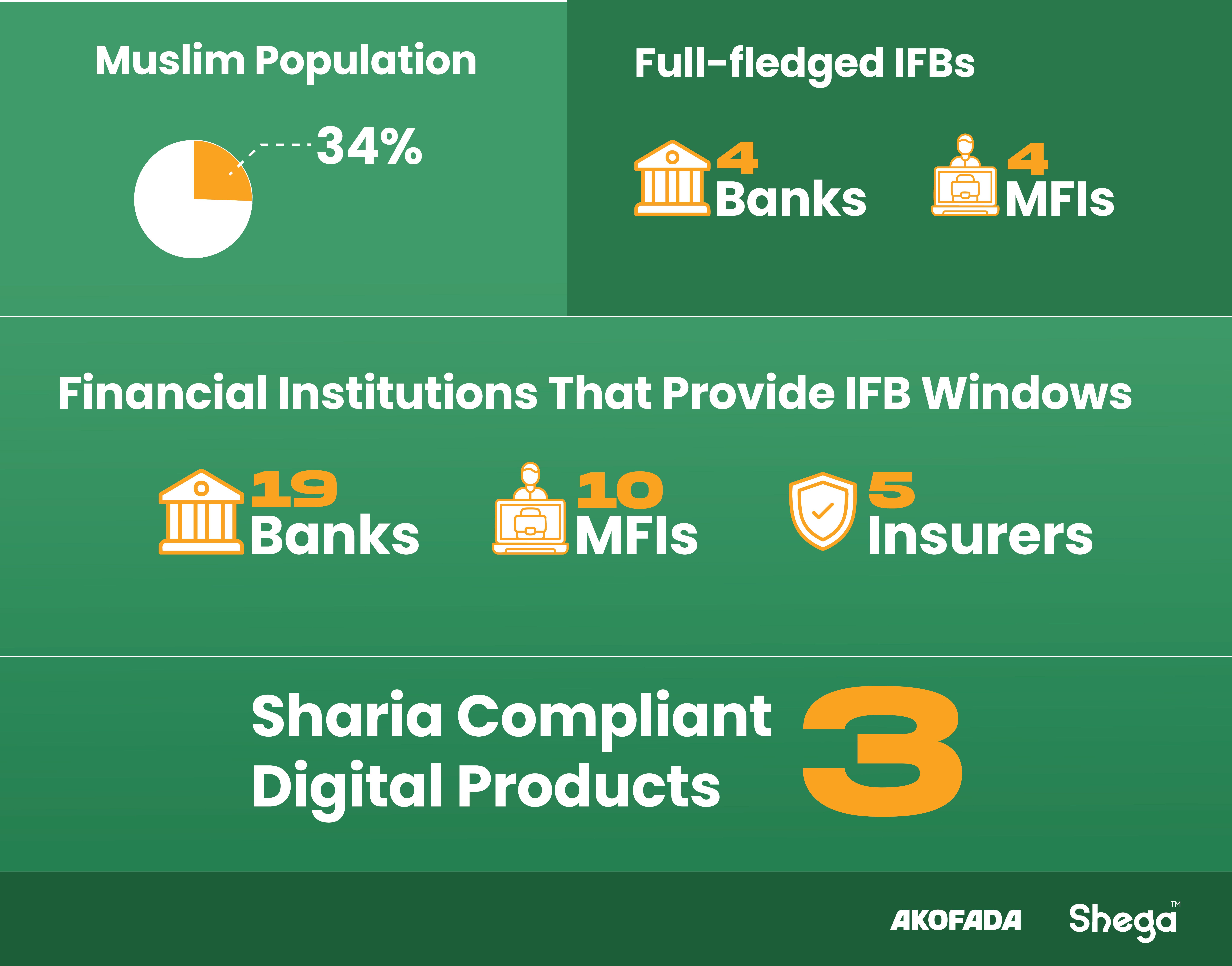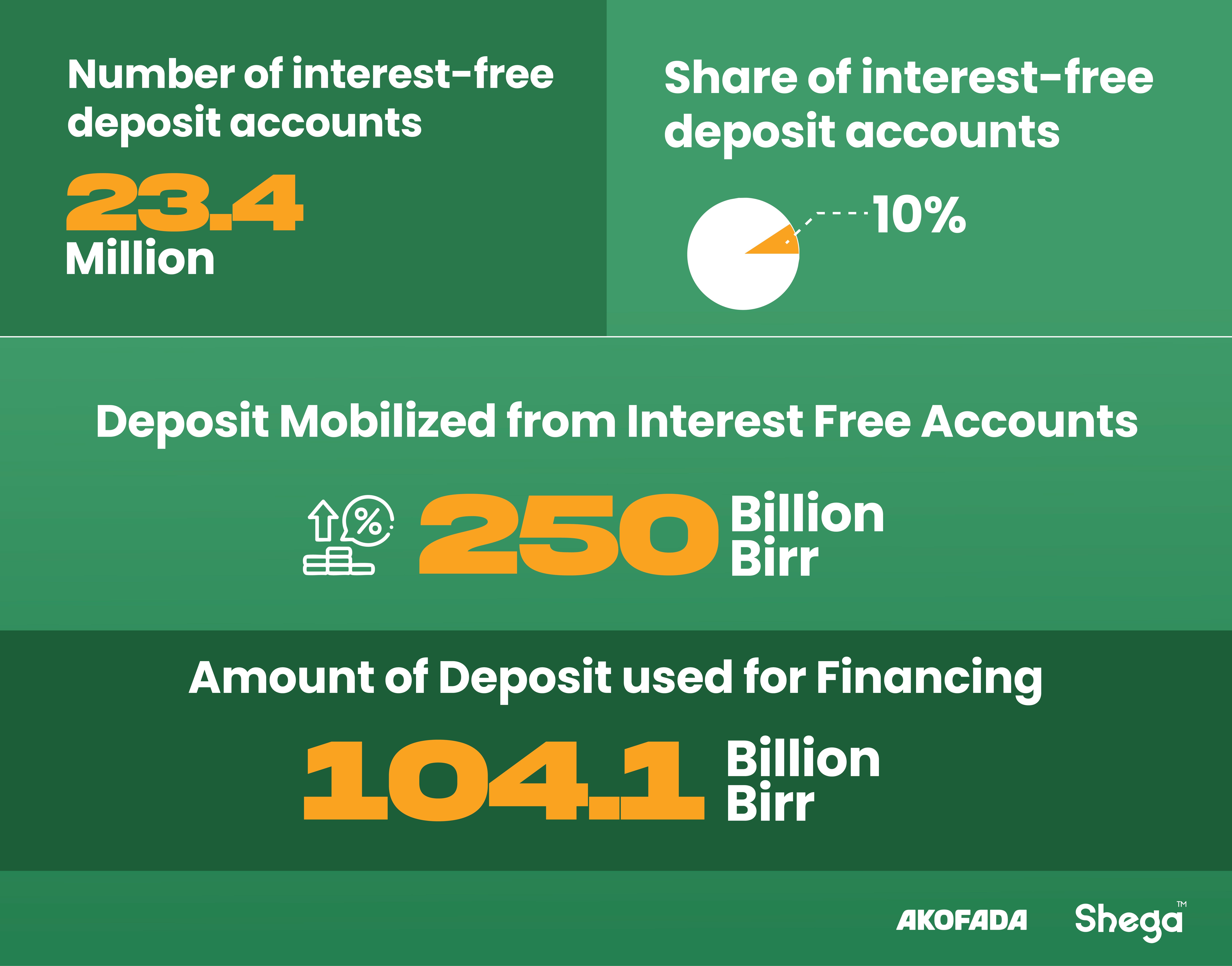Progress for 0 ad
Progress for 1 ad
Progress for 2 ad
Progress for 3 ad


Munir Shemsu
Addis Ababa, Ethiopia

Interest-Free Banking (IFB) in Ethiopia has failed to keep pace with the exponential growth of conventional banking. Today, interest-free deposit accounts represent less than 10% of total accounts in the country.
As the nation's financial sector shifts toward a digital, cash-lite economy, IFBs’ inability to transition into Sharia-compliant digital financial services could have severe consequences, further marginalizing a significant portion of the population from financial inclusion.
This article is an output of AKOFADA (Advancing Knowledge on Financial Accessibility and DFS Adoption), a project working to increase knowledge and transparency within Ethiopia’s DFS ecosystem.
During a New Year family trip to my grandparents’ home in Holeta, Oromia Regional State, five years ago, nearly every conversation revolved around one topic: money. My grandfather, a devout Muslim businessman for most of his life, avoided visits to the bank unless absolutely necessary. Whatever he managed to save, he would hide in various secret locations in his house or with one of his trusted kin. Just a week before our trip, the government had announced it would be changing Ethiopia’s currency notes. While my grandfather insisted that he had only a few thousand Birr lying around the house, he couldn’t stop thinking about the issue.
After receiving assurances from several family members who sensed his dilemma, he was finally convinced that his money could be deposited at a bank without accruing interest. Since the alternative meant ending up with a pile of worthless paper, he ultimately made discreet trips to nearby bank branches.
Similar stories were ubiquitous during the period, especially among rural Muslim communities. Some were even forced to dig out decades-old hidden stashes from their backyards. Since interest was strictly forbidden in Islam, most followers of the faith have historically avoided formal banking services. A significant figure considering that nearly 34% of the population identified as Muslim during the last national census. Until 2011, there was no formal banking service that catered to the interest-free requirements of Ethiopia’s vast Muslim population.
The central bank’s decision to allow interest-free banking windows within conventional banks came after considerable pressure. As Ethiopia was preparing to amend its banking business proclamation in the aftermath of the Great Recession, founders of what would ten years later be Zamzam Bank were lobbying to receive a full-fledged interest-free banking (IFB) license. While the central bank ultimately walked back its initial position to license full-fledged IFBs, it allowed conventional banks to operate interest-free windows. This regulatory tweak would prompt 19 banks, 10 micro-finance institutions, and five insurers to establish IFB windows by the end of the last fiscal year, enabling significant segments of the population, long excluded from the formal financial system, to finally feel included. But perhaps the most consequential of policy decisions would come about when the central bank allowed full-fledged IFBs in 2019, under a new administration.
In the years since, four full-fledged IFBs have been established: Zamzam Bank after a decade-long effort, Hijra, Ramis, and Shebelle, alongside four micro-finance institutions. The number of interest-free deposit accounts had grown to 23.4 million at the end of the last fiscal year, accounting for a little less than 250 billion Birr. These deposit accounts were less than 10% of the total accounts in the country, with just a little over 50,000 of them being credit accounts or rather financing accounts as they are referred to in Sharia-compliant banking.
This remains below the target set by Ethiopia’s National Financial Inclusion Strategy, which aims to scale up sharia-compliant financial products and services by increasing the share of sharia-compliant account ownership from 12% to 18% by 2025.
Still, the percentage of adults with formal bank accounts has perked up by almost 19% from around 40% six years ago. Nevertheless, with the National Bank of Ethiopia adopting an austere monetary policy as these IFBs began to operate and the absence of robust specialized regulations for IFBs, they have failed to mirror the exponential growth of their conventional counterparts. A growth barrier that partly stems from the very nature of IFB business, which avoids high-risk investments, outright restrictions on anything Haram (activities forbidden in Islam), and an emphasis on certainty being among them. But even in the limited space that Ethiopia’s IFB sector operates in, the adoption of an extremely conservative financing strategy has further constrained growth. Conventional and IFBs in Ethiopia eagerly sign on new interest-free depositors as it offers liquidity with basically no cost, despite requiring intricate acrobatics when asked for credit.
One VP of an Ethiopian full-fledged interest-free bank says only 40% of interest-free deposits are used for financing. His observation is supported by the numbers: as of the end of June 2024, just 104.1 billion Birr had been loaned out from a total of 250 billion Birr in interest-free deposits. Zamzam Bank, the most profitable of the full-fledged IFBs, had a liquid assets to total assets ratio of 40% in the last financial year, signaling a significant amount of static resources.
However, as Ethiopia’s financial sector increasingly transitions into a digital cash-lite dynamics, the inability of IFBs to adequately invest in technology and Digital Financial Services (DFS) could prove to be even more consequential in terms of financial inclusivity. Several markets and population segments will remain out of reach, while also necessitating interest-free services to play catch-up in the long run. Furthermore, insufficient attention to cater to Ethiopia’s nascent digital finance sector could undermine the country’s ambitions to expand formal banking service access in rural Ethiopia. The absence of a centralized Sharia-advisory board, an underdeveloped technology infrastructure, and limited use cases have further hindered the growth of interest-free DFS
In evaluating the interest-free digital landscape in Ethiopia, it is first important to distinguish which services have a particular bearing on the interest-free designation. Several banks offer mobile banking services like transfers and account checking functionalities, while just a handful provide interest-free financing services of any kind. ATM, agent banking, and POS services are also better analyzed in terms of access points for the whole banking sector, rather than just IFBs. Furthermore, the mobile banking and internet banking services for all commercial banks are basically identical and limited to account checking, transfers, bill payments, and a few other services. In terms of credit provisions, where the delineation of interest-free becomes most consequential, there are just a handful of players.
Zamzam Bank and Hijra Bank, which launched Sharia-compliant digital financing services a few months apart last year, are the only two full-fledged Islamic Financial Banks (IFBs) operating in the space. Dashen Bank’s Sharia-compliant Buy Now Pay Later (BNPL) service, launched a few months ago, is the only other interest-free credit product offered by a conventional bank.

Hijra Bank’s Halalpay Wallet is by far the most comprehensive and ambitious product for customers looking for a digital Sharia-compliant financial service in Ethiopia. Requiring minimal know your customer (KYC) procedures for the wallet, it combines agent banking services, credit, and typical mobile banking features. Multiple use cases, including bulk payments, cash-in-cash-out services, and interoperable QR code capabilities, also set Halalpay apart from other interest-free DFS in the market. Perhaps, the most consequential of the platform’s features pertain to its integration with Hijra’s core banking system and its enablement of financing services like e-Murabaha (cost plus markup financing model) for up to 150,000 Birr. During the three-month pilot stage before its official launch, Halalpay had onboarded over 120,000 customers, around 720 agents, and 470 merchant accounts.
Another interest-free DFS product is Zamzam’s Ansar platform, which leverages an AI system developed by Kifiya Financial Technologies to assess credit scores and unlock financing. Customers with an account at the Bank can buy a variety of Halal (permitted in Islam) commodities from the portal up to their financing limits. Zamzam charges a profit rate, commissions, and service fees, while penalties commence for ninety days past the initial due date. The platform also enables non-collateral-based micro-financing products like Salihat that offer monthly loans to women of up to 30,000 Birr with a 3.75% profit rate.
BNPL as a gateway towards interest-free digital financing appears to be the predominant entry modality for DFS products, as it easily mirrors the Murabaha financing arrangement. This partly arises from the core principle of Sharia-compliant banking, which requires financial transactions to be tied to tangible assets. Dashen Bank’s interest-free version of its BNPL service, dubbed Dube Ale also operates along the same lines while offering a significantly higher financing limit of up to 700,000 Birr. All other banks providing interest-free services also primarily provide Murabaha financing services, be it digitally or at bank branches.
Modern Sharia-compliant banking has a relatively short global history. The Mit Ghamr Savings Bank in Egypt, established in 1963 by Ahmed El Najjar (PhD), is regarded by most as the first to introduce institutionalized concepts of profit/sharing, partnerships, and cooperations as basic tenets. The Dubai Islamic Bank followed in 1975, with the Islamic Development Bank of Saudi Arabia catching up two years later. In the five decades since, nearly 100 countries have followed suit with varying degrees of development. Assets of the Sharia-compliant banking industry were forecasted to reach around $6.7 trillion by 2027 in the latest Islamic Finance Development Report. However, translating the core tenets to the digital landscape has not been straightforward for most financial institutions.
Malaysia, a country with one of the most developed interest-free finance sectors in the world, has over 17 fintech companies operating in the sector. The firms primarily facilitate peer-to-peer lending, supply chain finance for SMEs, and fundraising services. A vibrant Takaful sector, a Sharia-compliant pooled insurance scheme, has also emerged in recent years. Malaysia’s Securities Commission has also launched an accelerator program to further develop the sector by helping create fintech companies that provide Islamic social finance, Islamic funds, and wealth management services.
The Kingdom of Saudi Arabia, which looks to become a leading hub of financial innovation by 2030, also features several innovative Sharia-compliant DFS providers. Over 40 fintechs have springboarded from a regulatory sandbox by the Saudi Arabi Monetary Authority, offering a diverse set of services. Peer-to-peer financing, crowdfunding, and BNPL companies have dominated, while a few startups are exploring ways of creating Sharia-compliant smart contracts. Backed by robust regulatory support, startups in the Kingdom are among the few companies worldwide attempting to bridge the gap between cryptocurrency and Sharia law.

Another critical innovation by the Saudis, alongside Pakistan, has been the enablement of digital transactions for Sukuk bonds. The bonds differ from debt securities by conferring ownership in an asset or pool of assets on the holder rather than interest payments. Investors earn returns based on the performance of the underlying assets, such as rental income or business profits, instead of receiving interest. The global sukuk bond market has been growing in double digits over the past few years, with currently outstanding bonds valued at over a trillion dollars.
Across most that have made headway in innovating Sharia-compliant DFS, the ability to tap into existing opportunities with disruptive digital tools seems to make the difference. A World Bank study expresses it more comprehensively, stating that offering the same service as existing financial institutions or incumbents, yet with more convenience, lower fees, and better pricing.
As Ethiopia races towards ensuring that 70% of adults have access to formal banking services, significant reliance on DFS tools has proven to be an indispensable tool. The central bank recently announced a 129% increase in digital transactions year-on-year, valued at 9.7 trillion Birr, indicative of the rapid adoption. Nevertheless, the inability to onboard a Muslim population base of over 40 million into DFS could undermine both financial inclusion and digitization targets.
By first addressing the needs of the IFB sector for a national Sharia council, a dedicated IFB directorate at the National Bank of Ethiopia, and a sensitivity to IFBs in the formulation of laws, the central bank can become a major catalytic force. Ongoing banking and insurance reforms would also become maximally efficient through consideration of their impact on interest-free financial service providers.
Sandboxes tailored to creating solutions for Ethiopian consumers demanding Sharia-compliant services could serve as fertile grounds for innovation. Research into the barriers of the current legal and regulatory landscape funded by incumbent Sharia-compliant financial service providers might also unlock fresh insights and solutions. Furthermore, Ethiopia’s recent foray into capital markets should be steered in a manner cognizant of the vast resources that can be mobilized through Sharia-compliant products.
In a promising move, NBE has also outlined a short-term plan to introduce government debt securities such as Sukuk, develop non-interest-based monetary policy instruments, and establish an interest-free interbank money market. The regulator in collaboration with FSD Ethiopia, is assessing current monetary policy tools and proposing alternative instruments, as well as crafting an appropriate legal framework for government securities and interbank transactions tailored to interest-free banks.
With grit, innovation and a bit of luck, Sharia-compliant DFS could prove to be a critical piece in solving Ethiopia's financial inclusion puzzle.
👏
😂
❤️
😲
😠

Munir Shemsu
Munir S. Mohammed is a journalist, writer, and researcher based in Ethiopia. He has a background in Economics and his interest's span technology, education, finance, and capital markets. Munir is currently the Editor-in-Chief at Shega Media and a contributor to the Shega Insights team.
Your Email Address Will Not Be Published. Required Fields Are Marked *